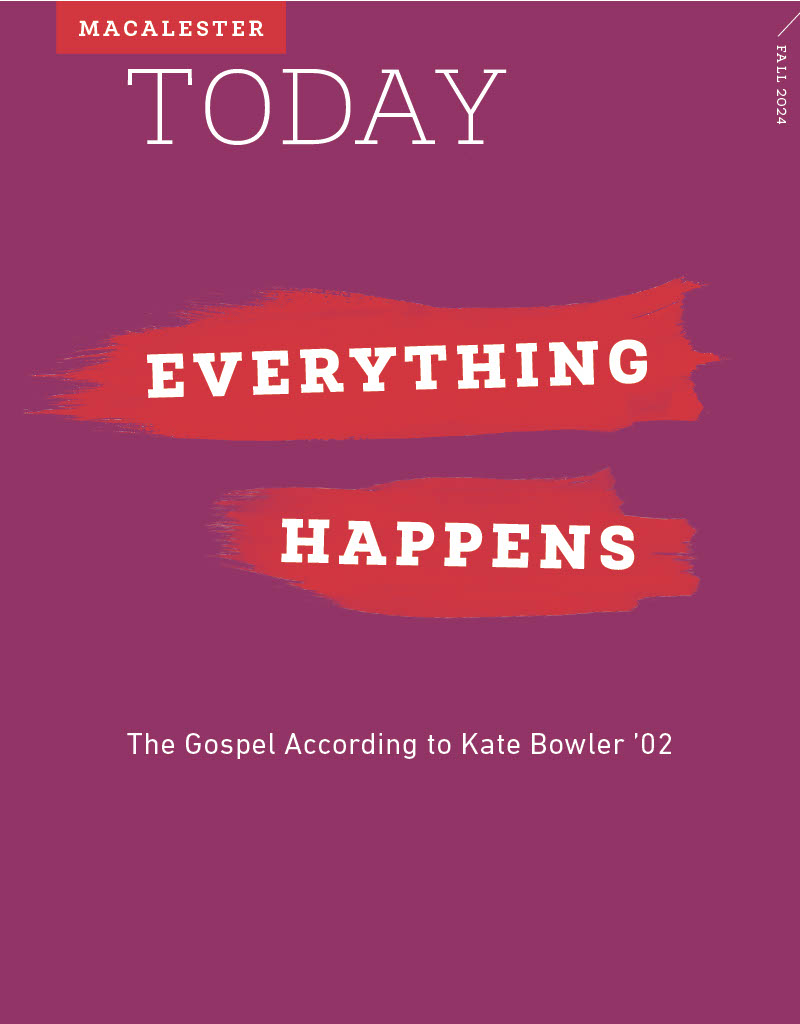
By Julie Hessler ’85
In Italy, says Christopher Franklin ’90, even the butcher who thinly slices your prosciutto knows opera. In the US, that’s not always the case. Franklin, who majored in music and German, has built a formidable reputation as a conductor, and last December he was named principal conductor of the Minnesota Opera. When he spoke with Macalester Today in July, he was preparing for two performances with the company—a November production of Gounod’s Romeo and Juliet, and a May 2025 production of Rossini’s The Barber of Seville—and many other performances across the globe. From his home studio in Lucca, Italy, he spoke to us about the life of a conductor, his love of opera, and where to start if you are new to opera.
What’s your process for preparing to conduct an opera?
Long. The performance is the tip of the iceberg: most of the preparation process is hours spent alone working through the score.
I’m currently working through the third act of Romeo and Juliet. The opera is in French, which I do speak, but not as fluently as English or Italian, so the work with the text is at times laborious. I have a piano in my studio, and so much of the process is playing and singing through the opera, even though I’m neither a great pianist nor singer. The important thing is that when you conduct the reading rehearsals with orchestra alone, to give the orchestra an accurate depiction of the drama on stage. From their place in the pit they can’t always see nor hear so well, so they depend on the conductor to keep it all together. If you’ve done your homework, by the time you get to first rehearsals with singers and orchestra, you know the opera inside out.
How do you balance tradition against your own interpretation?
It comes from going back to the score. The score for a conductor is your bible, it’s what the composer wrote and intended. Even if listening to CDs from the golden era of opera recordings in the second half of the twentieth century gives you an idea of what the piece sounds like and any traditions that are out there, what’s often missing is what’s behind the notes.
When looking at scores of Gioachino Rossini, for example (Italian opera composer 1792–1868), much of what we would expect from musicians nowadays in terms of performance practice is not actually in the parts. With him, a lot has to do with dynamic shadings and articulation. In spending time marking the score and parts, and thinking about the overall context of that piece historically, especially with earlier works, it brings you that much closer to the actual time period of that composer, and what they might have intended.
As an opera conductor, the most vital aspect of your music making is to accurately follow the drama onstage. At times the music relaxes in more tender moments, or surges forward in more dramatic confrontations, sometimes quite suddenly, which is why complete mastery of the text and drama are such an important part of the preparation process.
What are some other upcoming projects?
This fall, during the production in Minnesota, I’ll do a gala concert in Spain with Anna Pirozzi and Jorge de León—two big romantic singers—and a lot of Puccini and duets from Madama Butterfly and Tosca. After Romeo and Juliet, I have a couple of concerts with Juan Diego Flórez in Budapest. Then Otello in Novara and Cavalleria Rusticana/Pagliacci, a double bill of two operas, in Saint-Étienne. Then there’s a recording project with The Orchestra of the Maggio Musicale Fiorentino (Florence), which is right near where I live. And then I’m coming back to the Twin Cities for The Barber of Seville in the spring.
What is one of your career highlights?
When I first conducted Turandot in 2017 with the San Francisco Opera at the War Memorial Opera House. It was an experience I’ll never forget. The space is enormous. The voices you need for Turandot are just gigantic voices. We had an amazing cast. My wife came with our older son from Italy and my parents came and a bunch of my Macalester friends came as well. Most of my friends are not necessarily music lovers, or even art lovers, or opera lovers, but coming to see their friend who played on the Macalester soccer team with them conduct an opera is fun for them, too.
What do you love about opera?
I love that it’s still a live acoustic performance, and one of the last art forms where that’s actually the case. If you go to a rock or pop concert, it’s all amplified. Opera singers train their voices for years to basically shout over the orchestra, but in a controlled musical way. That a human being can sing over a live orchestra like that is actually incredible, and in that sense opera goes a step further than other arts—it combines many elements that the others don’t have. The German composer Richard Wagner had a wonderfully descriptive word to describe opera—Gesamtkunstwerk—in English, ”a complete work of art.”
If someone is new to opera, where might they begin?
I would start with Opera buffa, which in Italian means lighthearted or fun. The Barber of Seville is a perfect example. Other favourites are La bohème, Carmen, or to witness something bombastic, listen to Verdi’s Otello or Cavalleria Rusticana or Pagliacci, which are Italian grand operas. Speaking as a musician, that kind of music needs to be heard live, and there’s no better place than down at the Ordway with your own Minnesota Opera.
Julie Hessler ’85 is managing editor of Macalester Today.
November 18 2024
Back to top





